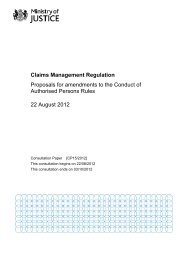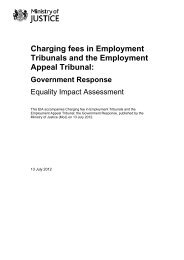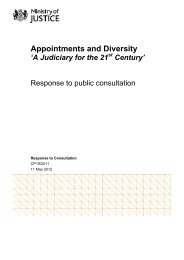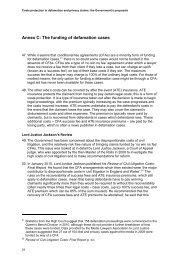Administrative Justice and Tribunals Council ... - Consultation Hub
Administrative Justice and Tribunals Council ... - Consultation Hub
Administrative Justice and Tribunals Council ... - Consultation Hub
You also want an ePaper? Increase the reach of your titles
YUMPU automatically turns print PDFs into web optimized ePapers that Google loves.
alluded to by Baroness Scotl<strong>and</strong> of Asthal during the passage of the Public Bodies Bill in<br />
the Lords. She said:<br />
“The council believes that the Government bear responsibility for causing many of<br />
the appeals in the administrative justice system through poor decision-making, poor<br />
communication, delay <strong>and</strong> overly complex or incomprehensible rules. Not only will<br />
the legal aid cuts affect individual claimants, they will contribute to increasing work<br />
<strong>and</strong> delays in courts <strong>and</strong> tribunals that are already under pressure. How will such a<br />
challenge to the department that is also responsible for legal aid be made, made<br />
independently, <strong>and</strong> by whom The value of an independent critical eye will remain<br />
present.”<br />
We question both the estimate of the savings that will be achieved through abolition of the<br />
AJTC <strong>and</strong> the assertion that a “dedicated team” in the Ministry of <strong>Justice</strong> will take over the<br />
work of the AJTC. We believe the likely actual ‘saving’ to be made from AJTC abolition,<br />
assuming closure on 31 March 2012, will be in the order of £2 million for the financial years<br />
2012-13 to 2014-5, <strong>and</strong> not the £4.3 million estimated by MoJ. The MoJ figure is based on<br />
an assumed saving of £1.4m for each of these three years, rounded up for inflation. The<br />
AJTC’s actual annual expenditure since 2007, including the costs of its Scottish <strong>and</strong> Welsh<br />
Committees, <strong>and</strong> projected expenditure for 2011/12 are as follows:<br />
2007/8 2008/9 2009/10 2010/11 2011/12<br />
(projected)<br />
1,114,931 1,107,782 1,193,350 1,009,704 907,000<br />
We believe that £1m, <strong>and</strong> not the £1.4 m figure quoted in the consultation paper, is closer<br />
to the actual annual gross sum that that will be saved in the next 3 financial years should<br />
the AJTC be abolished, <strong>and</strong> this saving will be reduced by the costs of closure, which MoJ<br />
estimates to be £0.6m over this period, <strong>and</strong> also by the cost of the new dedicated MoJ staff<br />
team.<br />
The Government has not attempted to cost its “dedicated team” in MoJ. The team is<br />
responsible for ‘business as usual’ recently transferred from the <strong>Tribunals</strong> Service,<br />
providing support to the Tribunal Procedure Committee <strong>and</strong> creation of the new Property<br />
L<strong>and</strong>s <strong>and</strong> Housing Chamber of the First Tier Tribunal. The resource available to replace<br />
the work of the AJTC appears to amount to little more than one or two newly-appointed<br />
officials who have administrative justice policy as part of their wider portfolio. There is no<br />
guarantee that even this resource will be retained for any length of time as the restructuring<br />
of the MoJ’s <strong>Justice</strong> Policy Group is still ongoing, with the risk that the staff<br />
concerned will be reallocated to work regarded as a higher priority at any time, as has<br />
already happened this year. It seems to us highly likely that this small resource will quickly<br />
be lost because administrative justice does not feature in MoJ’s published strategic plans.<br />
We respect <strong>and</strong> value the work of MoJ officials, with whom our secretariat works closely,<br />
but we do not accept that an advisory council of sixteen experienced <strong>and</strong> well-connected<br />
administrative justice experts, supported by a small team of dedicated policy officers, can<br />
easily be replaced by the full-time equivalent of less than two civil servants. We share the<br />
view of Lord Borrie, who said in the House of Lords:<br />
“The council <strong>and</strong>, for five decades, its predecessor, the <strong>Council</strong> on <strong>Tribunals</strong>,<br />
invariably consisted of judges, practitioners, academics <strong>and</strong> others from various<br />
backgrounds … full-time civil servants cannot replicate the breadth of knowledge<br />
<strong>and</strong> empirical experience that is so useful”














